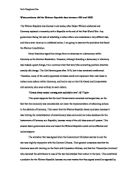What problems did the Weimar Republic face in the early 1920s in Germany?
In 1918, Germany became a democratic republic following the abdication of Kaiser Wilhelm II. A new constitution was drawn up in 1919, at Weimar. In the first four years, the new Weimar Republic struggled to survive; it had to overcome a range of problems, including political weaknesses, political opposition and serious economic problems.
With attempts to create a stable and strong democratic Republic in Germany, the Republic had some political weaknesses. The new republic was associated with the defeat of Germany in 1918 because it was created as a result of it, this made the republic appear weak. The new republic and the socialist politicians associated with it, were seen as traitors by some German people because they signed the humiliating Treaty of Versailles; as a result some politicians (such as Walther Rathenau) were assassinated. This was of course understandable as the German people felt deeply betrayed by the signing of the peace treaty certain people believed that Germany had not been defeated at all but had been 'stabbed in the back' by various subversives on the home front - socialists, Bolshevists, Jews, liberals, organized labour and so on. It was obvious to some from the start that Germany was not used to democracy but strong leadership; so with frequent changes in government it made the new republic look even weaker. All of this is what failed to gain the Weimar Republic widespread support in the early years.







